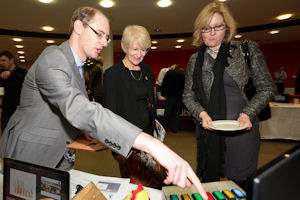University celebrates its staff’s innovation and passion
09 Jan 2014
Investing in Success projects show money well spent

The University celebrated the innovative ideas of its staff, brought to life by the £1.3 million career development project ‘Investing in Success’.
More than 150 projects – including a gadget to enthuse children about computer science, a national campaign to help young cancer sufferers and a mobile phone app allowing our students to give immediate feedback to their lecturers – were set up by the pilot scheme designed to boost staff development and benefit the University.
And 30 of them were on display for the Senior Leadership Team and relevant line managers to see how the funding was well spent.
The range and diversity of projects demonstrated just how passionate and innovative colleagues are about their work here at the University.
The exhibitors included Dr Andrew Robinson, who used the funding to develop PiFace, an add-on for the mini-computer Raspberry Pi, to hook it into real-life applications. The gadget, and a series of events to showcase it, fired up not only youngsters, but teachers, parents, pensioners and University colleagues too, with new uses created in schools, homes and across the campus. One use – monitoring the activity around a woodland bird box – has now featured on BBC’s Springwatch, watched by more than two million viewers. There’s also a diet monitor to keep you away from the biscuit cupboard and a train timetable warning system for the front door, telling you when your train is late as you leave the house.
Dr Kate Vaughan showed delegates her nationwide campaign to help young cancer sufferers ‘Sometimes It’s Cancer’. Kate, a Manchester Teenage Cancer Trust Programme Manager, explained: “About 2,500 young people in the 13-24 age range are affected by cancer every year. We have to make these young people more aware of the common signs to look out for. The Investing in Success award was a real boost at the right time.” She and her “brilliant team” talk to students across the country in schools and universities to spread the word, as well as running a website that appeals to the age group.
Dr Joyce Tyldesley was on hand to showcase the range of unique copyright-free learning materials: photographs, film clips, filmed and recorded interviews that she gathered for her Egytology distance course, which teaches students across the world. Joyce explained: “We can bring Egypt to our students, wherever they are in the world. We have a fantastic mix of students of all ages. They are the most enthusiastic and committed students you could wish for. Egyptology is something they’ve always wanted to do.”
The President and Vice-Chancellor Professor Dame Nancy Rothwell was impressed: "I could not have imagined when we launched this pilot fund how our staff would respond with such passion and enthusiasm.
“The quality of the applications was very high and this point was heavily emphasised when Rod Coombs and Karen Heaton reported back on the applications process to the Senior Leadership Team. So high, in fact, that they presented me with an option to raise the level of investment. It was difficult saying “no” to some projects but unfortunately we had to even, with the increase in investment to £1.3million.
“I am delighted that we have this opportunity to get a flavour of some of the excellent projects enabled by the Investing in Success Programme and I would like to congratulate everyone who successfully took part in the scheme and also express my thanks to you and to those who have supported you.”
‘Investing in Success’ was launched in November 2011, designed to identify and support members of staff who could benefit from a modest amount of extra resource to help them engage in a particular project or activity which will accelerate their personal development and benefit the University.
The funds - up to £15,000 per project - were to be awarded to staff irrespective of their grade or length of service; the project simply had to be innovative and make them better teachers, researchers, managers, professionals and support staff.
The University received 315 applications, 150 of which were successful.
Director of Human Resources Karen Heaton, who hosted the event, said: “The event was a tremendous success and provided an opportunity for participants to showcase their varied, interesting and impressive projects. Everyone I spoke to was very enthusiastic about the opportunity the Investing in Success Programme had provided for them with some gaining additional external funding to further develop their ideas.”
